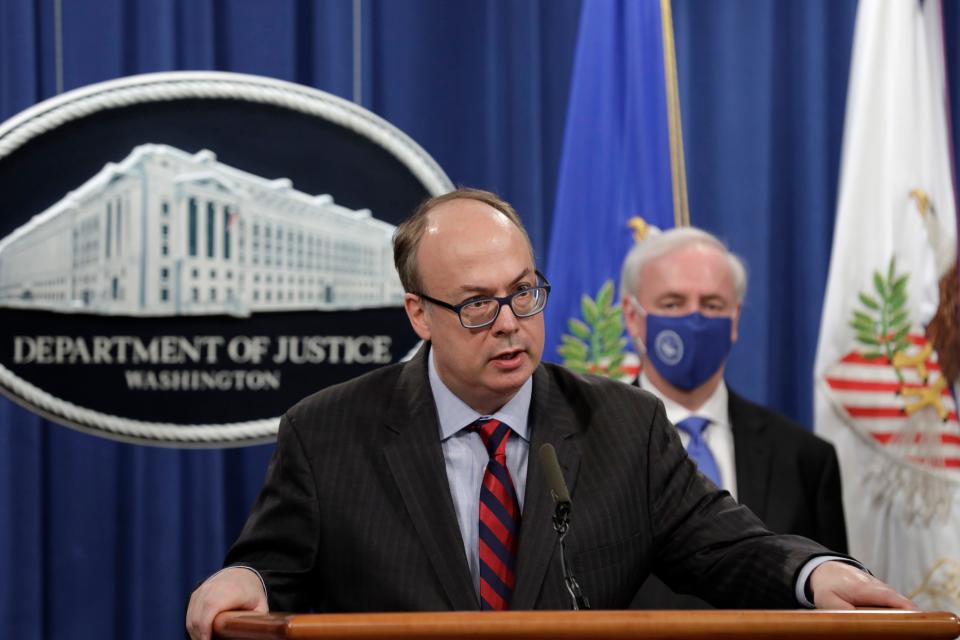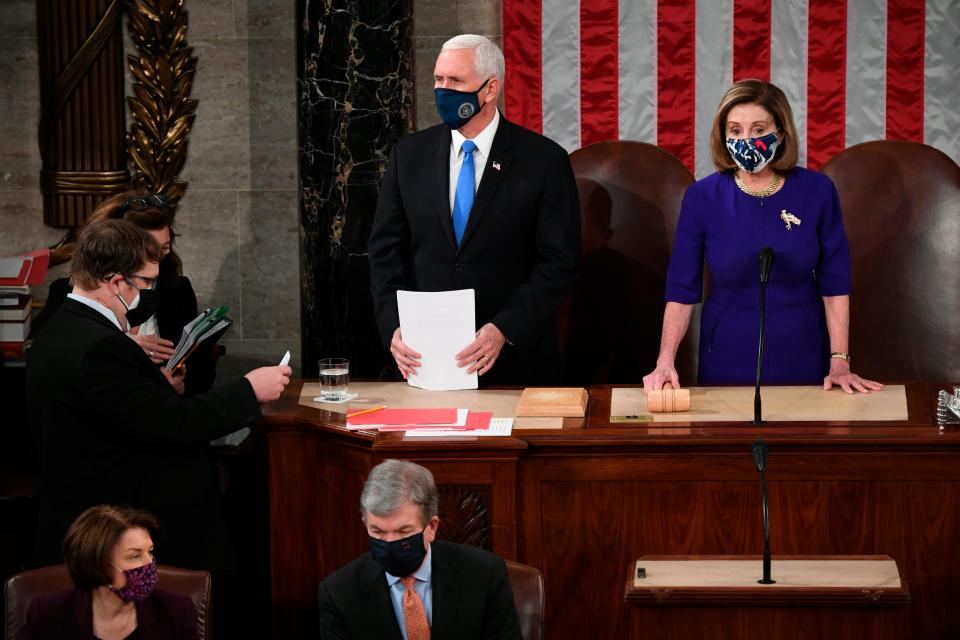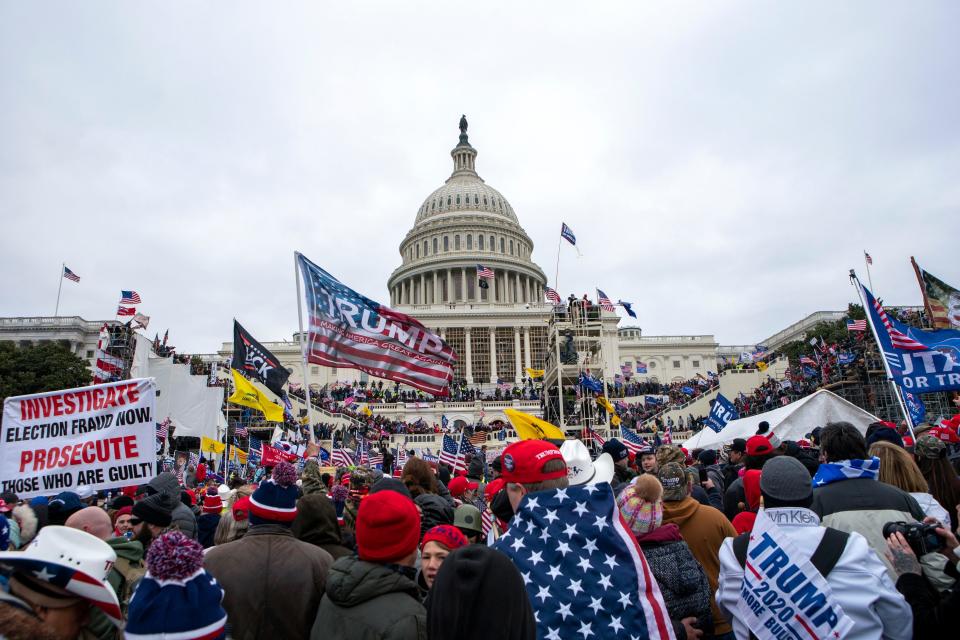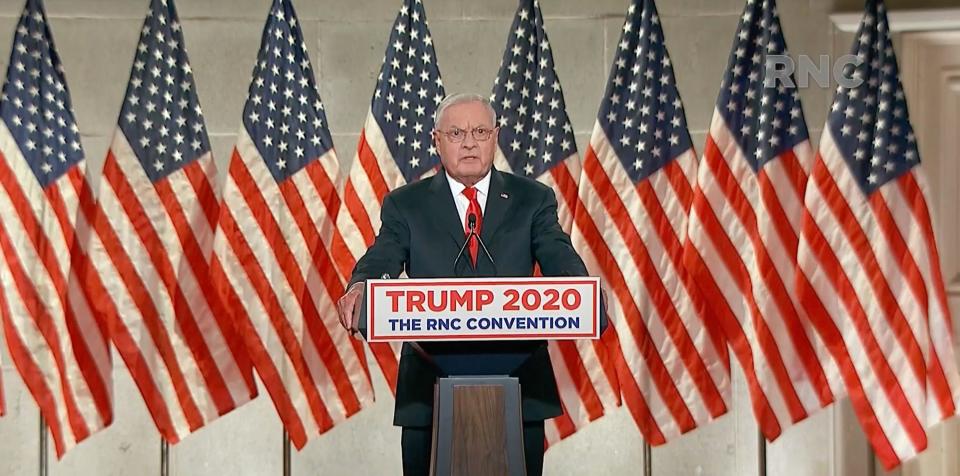'Very strange and somewhat alarming': White House, Justice aides offer insider accounts of Jan. 6 Capitol attack
- Oops!Something went wrong.Please try again later.
- Oops!Something went wrong.Please try again later.
- Oops!Something went wrong.Please try again later.
WASHINGTON – Cassidy Hutchinson. Richard Donoghue. Greg Jacob. Benjamin Williamson. Keith Kellogg. None of these former White House and Justice Department staffers have household names – but that could change with testimony each provided to the House committee investigating the Capitol attack on Jan. 6, 2021.
These behind-the-scenes players provided the panel with insight into the run-up to the attack and how key figures such as former President Donald Trump, his White House chief of staff, Mark Meadows, and former Vice President Mike Pence responded that day.
Hutchinson, a special assistant to the president for legislative affairs and aide to Meadows, told the committee about White House strategy sessions where lawmakers discussed how to reject electors from specific states, how Meadows communicated with encrypted applications and how he burned documents in his office fireplace, according to reports in The New York Times and Politico.
Jan. 6 committee's long-awaited hearings promise revelations: Will a divided US want to hear them?
Text with the USA TODAY newsroom about the day’s biggest stories. Sign up for our subscriber-only texting experience.
Donoghue, the former deputy attorney general, described an Oval Office showdown three days before the riot over whether Trump should replace his acting attorney general with someone more willing to challenge state election results, according to a deposition transcript. Trump relented after the leadership of the Justice Department and White House counsel's office all threatened to quit – "a huge personnel blowout within hours" – if he executed the move, Donoghue said.
Jacob, Pence's counsel, provided the legal justification for the vice president to refuse to reject electors from states Trump lost. When Pence was forced to evacuate the Senate chamber, Jacob blasted Trump lawyer John Eastman's legal arguments to overturn the election results in an email as the reason for the "siege."
Williamson, deputy assistant to president and another senior adviser to Meadows, urged the chief of staff unsuccessfully to persuade Trump to issue a statement as the situation at the Capitol became “hairy” on Jan. 6, according to a deposition transcript.
Kellogg, a retired lieutenant general who served as Pence's national security adviser, told the committee how he urged senior White House adviser Ivanka Trump to persuade her father to issue a statement, according to a deposition transcript. Kellogg called her heroic for meeting with her father at least twice.
What will come out of the Jan. 6 investigation?: After Jan. 6, lawmakers want to clarify that vice presidents have ceremonial role in counting votes
Subpoena list: Who has been subpoenaed so far by the Jan. 6 committee?
The statements are just a glimpse of testimony from more than 1,000 witnesses who helped the committee piece together a chronology of what led to the riot and what happened that day at the Capitol and in reaction at the White House. Hearings to reveal the findings begin Thursday.
"The committee wants to give every opportunity to people to come forward with information relevant to the investigation," said one member, Rep. Jamie Raskin, D-Md. "We feel that's true regardless of your political party or job or title."
The cooperation of more than a dozen White House aides stood in contrast to members of Trump’s inner circle, who defied subpoenas and face the prospect of contempt charges.
“Almost all, if not all, meetings Mr. Trump had, I had insight on,” Hutchinson said.
Ivanka Trump; her husband, Jared Kushner; and son Donald Trump Jr. have each appeared before committee. But many marquee names are unlikely to testify. The committee isn’t expected to call Trump or Pence because their aides have been forthcoming.
Five House Republicans who were subpoenaed – House Minority Leader Kevin McCarthy of California and Reps. Andy Biggs of Arizona, Mo Brooks of Alabama, Jim Jordan of Ohio and Scott Perry of Pennsylvania – defied their subpoenas. They’ve called the investigation a partisan witch hunt.
The House cited four Trump aides – Meadows, political strategist Steve Bannon, former deputy chief of staff Dan Scavino and former trade adviser Peter Navarro – with contempt. Bannon and Navarro face criminal contempt charges.
Only portions of depositions have been released so far as part of court filings in cases where subpoena recipients are fighting the committee. Here is some of the witness testimony released so far:

Hutchinson: Meadows attends strategy sessions at White House to reject electors
Hutchinson, with a key vantage point as Meadows' aide, provided the committee with information on a variety of subjects.
Hutchinson named the lawyers and lawmakers who met at the White House to challenge electors in several states Trump lost. She said the strategy sessions in person and by phone included Biggs, Brooks, Jordan, Perry, Jordan and Reps. Matt Gaetz, R-Fla., Louie Gohmert, R-Texas; Paul Gosar, R-Ariz.; Jody Hice, R-Ga.; and Debbie Lesko, R-Ariz.
Meadows traveled Dec. 22 to Cobb County, Georgia, to meet with deputy secretary of state Jordan Fuchs and to see ballot counting during an audit of voter signatures. Hutchinson said Meadows was visiting his son in Georgia for Christmas so monitoring the ballot counting was convenient.
"He wanted to do more of a status check to see where they were at with things, if they had thoughts that they needed any more resources, if there was anything that the White House could do to help ease the process along," Hutchinson said.
She also described attempts to keep communications confidential. Meadows communicated through the encrypted application Signal with Perry, an advocate of replacing Acting Attorney General Jeffrey Rosen with someone more willing to challenge state election results, such as Assistant Attorney General Jeffrey Clark, according to court records.
“Just sent you something on Signal,” Perry texted Meadows on Dec. 26. “Did you call Jeff Clark?”
Meadows reportedly burned documents in his office after meeting with Perry in the weeks after the election, according to Hutchinson.
Hutchinson also told the panel Meadows told colleagues after watching television coverage Jan. 6 of the riot Trump spoke approvingly of the chants to hang Pence, according to the New York Times.

Donoghue: Justice, White House legal leadership threaten to resign if Trump ousts acting attorney general
Donoghue, the deputy attorney general, said Rosen and Clark had a long personal and professional relationship, having known each other for decades and previously worked at the same law firm.
But Clark wanted to replace Rosen, and Donoghue said Trump held a two-and-a-half hour meeting in the Oval Office to discuss it. Others in the meeting were White House counsel Pat Cipollone, deputy counsel Pat Philbin, assistant attorney general Steve Engel and lawyer Eric Herschmann. Donoghue said all were opposed to replacing Rosen except Clark. Trump said others urged him to fire Rosen and Donoghue.
“You’re going to hurt the country, you’re going to hurt the department, you’re going to hurt yourself, with people grasping at straws on these desperate theories about election fraud, and is this really in anyone’s best interest,” said Donoghue, who threatened to resign rather than serve one minute under Clark.
Donoghue argued that Clark wasn't qualified to serve as attorney general because he had never been a criminal attorney or been in front of a grand jury, much less a trial jury. Clark replied that he had conducted complicated appeals and civil litigation for the environment, according to Donoghue.
“That’s right. You’re an environmental lawyer. How about you go back to your office and we’ll call you when there’s an oil spill?” Donoghue replied.
Clark had asked Rosen on Dec. 28 to sign a letter drafted to Georgia’s governor and legislative leaders asking them not to certify their election results, Donoghue said. The draft letter could also be sent to other states, he said.
"That letter is a murder-suicide pact," Donoghue quoted Cipollone as saying. "It's going to damage everyone who touches it."
More: DOJ requests Jan. 6 committee transcripts, signaling escalation of Justice inquiry
States run elections and the Justice Department doesn't handle quality control for states, Donoghue said he tried to explain to Clark.
“It struck me as very strange and somewhat alarming,” Donoghue said of Clark's proposed letter. “I tried to make it clear to him that this is not the department’s role. Again, we don’t do quality control for state elections.”
Donoghue also said Rosen got angry after learning Clark, the acting head of the civil division, asked Dec. 28 for a classified briefing about internet connections from U.S. voting machines to China, through smart thermostats.
“Yes, it struck me as odd,” Donoghue said.
Clark refused to answer committee questions by invoking his Fifth Amendment right against self-incrimination.

Jacob faults Trump lawyer for 'siege'
The vice president's chief of staff, Marc Short, alerted the head of Pence’s Secret Service detail the evening before the riot that Trump was likely to publicly criticize Pence, which could lead to a security threat, according to The New York Times.
Trump's pressure continued Jan. 6 through tweets and calls. Trump missed Pence in a call about 9 a.m. and they chatted by phone about 11:20 a.m. Kellogg, Pence’s national security adviser, was present and said Trump berated Pence as “not tough enough to make the call,” according to court records.
At 2:14 p.m., Jacob emailed Eastman to say rioters believed what they were sold about his legal theory “and thanks to your bull****, we are now under siege,” according to court records.
Trump poured on more fuel 10 minutes later.
“Mike Pence didn’t have the courage to do what should have been done to protect our Country and our Constitution, giving States a chance to certify a corrected set of facts, not the fraudulent or inaccurate ones which they were asked to previously certify,” Trump tweeted at 2:24 p.m.
At 2:25 p.m., Eastman emailed Jacob: “The ‘siege’ is because YOU and your boss did not do what was necessary to allow this to be aired in a public way so the American people can see for themselves what happened,” according to court records.
Eastman continued to insist at 6:09 p.m. that adjourning Congress so state legislatures could potentially change their votes was the “most prudent course.”
“I’m implore you to consider one more relatively minor violation and adjourn for 10 days,” Eastman wrote in a final email at 11:44 p.m., after Congress returned to finish the count early the next morning.

Williamson urged Trump statement as Hill got 'hairy'
Williamson, who had worked on the Hill with Meadows before moving to the White House, saw the violence unfolding at the Capitol on television while eating his lunch in his office. He said the mob breaching bicycle racks outside the Capitol. After seeing an exchange of pepper spray between rioters and Capitol police, Williamson chatted with other staffers about the situation deteriorating.
Williamson said he sent a message to Meadows because a Trump tweet was considered was the fastest way to get something done.
“Would recommend POTUS put out a tweet about respecting the police over at the Capitol – getting a little hairy over there,” Williamson texted Meadows at 2:02 p.m., just before rioters broke into the building through windows and doors.
PREVENTING ANOTHER RIOT: Jan. 6 committee examines how Capitol riot unfolded – and how to prevent it from happening again
After sending the text, Williamson went to speak with Meadows, who immediately got up and left his office. Williamson followed Meadows to the hallway outside the Oval Office but didn’t see his boss meeting with Trump.
“He immediately looked like he had heard what I had to say and was jumping to it,” Williamson said of Meadows.

Kellogg calls Ivanka Trump 'heroic' for confronting president
Kellogg described walking into the Oval Office and the presidential dining room next door, where Trump was watching television.
“My belief at the time was, based on personal experience, this had gotten out of control,” Kellogg said. "I don't care if you were God. You couldn't control it."
But he wanted the president to issue a statement to calm the situation down and avoid losing the Capitol.
"What I mean by losing it, somebody being really stupid. You know, you got Chewbacca running around out there, whatever his name was," Kellogg said.
He urged Ivanka Trump to speak with her father because he thought her closer to the president than any other adviser. Kellogg said he saw her emerging from the Oval Office twice.
“I think she went back there because Ivanka Trump can be pretty tenacious,” Kellogg said. “I think it was one of those that Ivanka would bring raw truth to an issue.”
The day after the attack, Kellogg said he told Ivanka Trump he appreciated what she did.
"You know, I just thought what you did was to me pretty heroic," Kellogg said he told her. "And she said: 'Well, my dad's stubborn.'"
This article originally appeared on USA TODAY: White House, Justice aides describe marquee players in Jan. 6 attack

